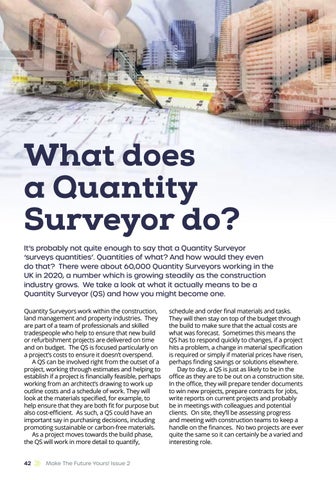What does a Quantity Surveyor do? It’s probably not quite enough to say that a Quantity Surveyor ‘surveys quantities’. Quantities of what? And how would they even do that? There were about 60,000 Quantity Surveyors working in the UK in 2020, a number which is growing steadily as the construction industry grows. We take a look at what it actually means to be a Quantity Surveyor (QS) and how you might become one. Quantity Surveyors work within the construction, land management and property industries. They are part of a team of professionals and skilled tradespeople who help to ensure that new build or refurbishment projects are delivered on time and on budget. The QS is focused particularly on a project’s costs to ensure it doesn’t overspend. A QS can be involved right from the outset of a project, working through estimates and helping to establish if a project is financially feasible, perhaps working from an architect’s drawing to work up outline costs and a schedule of work. They will look at the materials specified, for example, to help ensure that they are both fit for purpose but also cost-efficient. As such, a QS could have an important say in purchasing decisions, including promoting sustainable or carbon-free materials. As a project moves towards the build phase, the QS will work in more detail to quantify, 42
Make The Future Yours! Issue 2
schedule and order final materials and tasks. They will then stay on top of the budget through the build to make sure that the actual costs are what was forecast. Sometimes this means the QS has to respond quickly to changes, if a project hits a problem, a change in material specification is required or simply if material prices have risen, perhaps finding savings or solutions elsewhere. Day to day, a QS is just as likely to be in the office as they are to be out on a construction site. In the office, they will prepare tender documents to win new projects, prepare contracts for jobs, write reports on current projects and probably be in meetings with colleagues and potential clients. On site, they’ll be assessing progress and meeting with construction teams to keep a handle on the finances. No two projects are ever quite the same so it can certainly be a varied and interesting role.

















